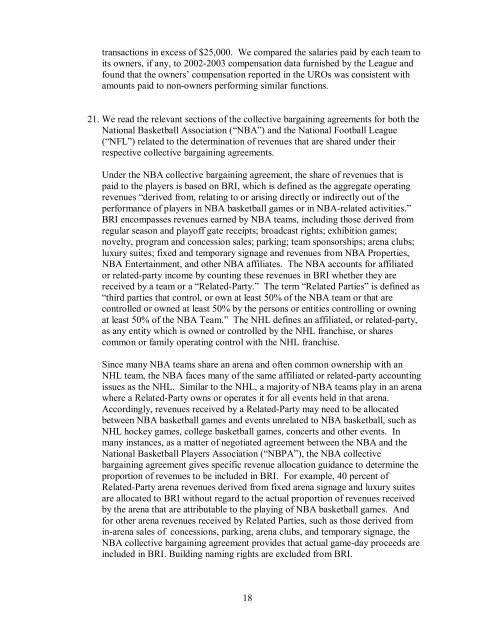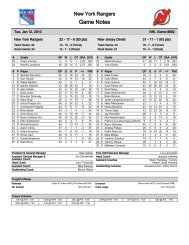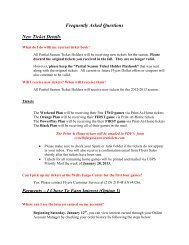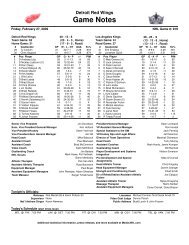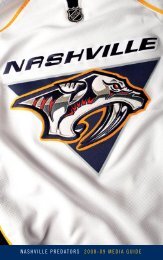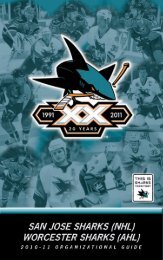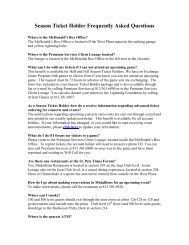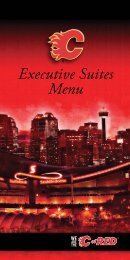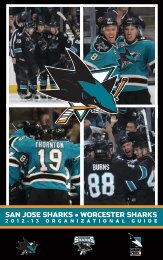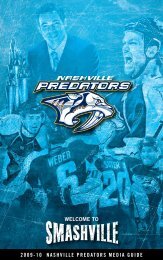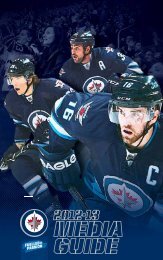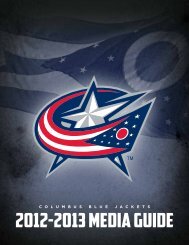Levitt Report - NHL.com
Levitt Report - NHL.com
Levitt Report - NHL.com
You also want an ePaper? Increase the reach of your titles
YUMPU automatically turns print PDFs into web optimized ePapers that Google loves.
transactions in excess of $25,000. We <strong>com</strong>pared the salaries paid by each team toits owners, if any, to 2002-2003 <strong>com</strong>pensation data furnished by the League andfound that the owners’ <strong>com</strong>pensation reported in the UROs was consistent withamounts paid to non-owners performing similar functions.21. We read the relevant sections of the collective bargaining agreements for both theNational Basketball Association (“NBA”) and the National Football League(“NFL”) related to the determination of revenues that are shared under theirrespective collective bargaining agreements.Under the NBA collective bargaining agreement, the share of revenues that ispaid to the players is based on BRI, which is defined as the aggregate operatingrevenues “derived from, relating to or arising directly or indirectly out of theperformance of players in NBA basketball games or in NBA-related activities.”BRI en<strong>com</strong>passes revenues earned by NBA teams, including those derived fromregular season and playoff gate receipts; broadcast rights; exhibition games;novelty, program and concession sales; parking; team sponsorships; arena clubs;luxury suites; fixed and temporary signage and revenues from NBA Properties,NBA Entertainment, and other NBA affiliates. The NBA accounts for affiliatedor related-party in<strong>com</strong>e by counting these revenues in BRI whether they arereceived by a team or a “Related-Party.” The term “Related Parties” is defined as“third parties that control, or own at least 50% of the NBA team or that arecontrolled or owned at least 50% by the persons or entities controlling or owningat least 50% of the NBA Team.” The <strong>NHL</strong> defines an affiliated, or related-party,as any entity which is owned or controlled by the <strong>NHL</strong> franchise, or shares<strong>com</strong>mon or family operating control with the <strong>NHL</strong> franchise.Since many NBA teams share an arena and often <strong>com</strong>mon ownership with an<strong>NHL</strong> team, the NBA faces many of the same affiliated or related-party accountingissues as the <strong>NHL</strong>. Similar to the <strong>NHL</strong>, a majority of NBA teams play in an arenawhere a Related-Party owns or operates it for all events held in that arena.Accordingly, revenues received by a Related-Party may need to be allocatedbetween NBA basketball games and events unrelated to NBA basketball, such as<strong>NHL</strong> hockey games, college basketball games, concerts and other events. Inmany instances, as a matter of negotiated agreement between the NBA and theNational Basketball Players Association (“NBPA”), the NBA collectivebargaining agreement gives specific revenue allocation guidance to determine theproportion of revenues to be included in BRI. For example, 40 percent ofRelated-Party arena revenues derived from fixed arena signage and luxury suitesare allocated to BRI without regard to the actual proportion of revenues receivedby the arena that are attributable to the playing of NBA basketball games. Andfor other arena revenues received by Related Parties, such as those derived fromin-arena sales of concessions, parking, arena clubs, and temporary signage, theNBA collective bargaining agreement provides that actual game-day proceeds areincluded in BRI. Building naming rights are excluded from BRI.18


